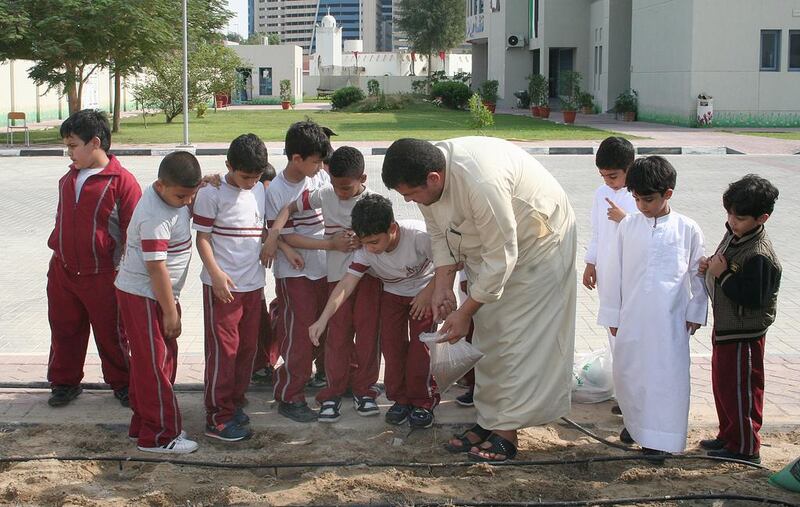DUBAI // A healthy food initiative is helping to nurture a love of fruit and vegetables among students from the ground up.
Over the past year the Ministry of Education has been working with PH7 Catering Services to deliver fresh food to 54 government schools in Dubai and the Northern Emirates to improve nutrition in canteens.
Organic farming was also introduced in one school.
“You know kids do not like fruits and vegetables until they get to know the product,” said Greta Ferloni, food awareness and compliance manager for PH7. “So we thought involving them in growing products will encourage the consumption, that was our idea.”
Ms Ferloni said local farmers from Integrated Green Resources teamed up with Cycle One students as part of the farming project at Dubai’s Zayed bin Sultan Boys School for Basic Education. They planted seeds and watched farmers nurture the soil.
The pupils also received educational material about how to set up an organic garden at home and learned about the nutritional value of the school-grown produce.
“We set up two gardens. The first was for herbs and the other vegetables. We had zucchini, tomatoes, carrots, eggplants and the feedback from students was really positive,” said Ms Ferloni.
“They enjoyed planting the seeds and seeing them grow. They were surprised to see carrots growing underground and not on a big tree.”
The participating schools received a daily supply of fresh food by PH7 and Jabal Al Zaytoon that met strict nutritional guidelines set by the MoE. They were also ordered to remove all junk food and are only allowed to sell healthy snacks and lunch boxes containing water, one serving of fruit, one of vegetables, a wholewheat product, and natural fruit juice.
“At the beginning it was difficult because we stopped giving any kind of junk food, chips, chocolate and tried to provide them with healthy food,” said Aisha Alsiri, the MoE’s director of nutrition and school health.
“But now everybody I talk to are waiting for the children to come with their food from the school. Because you know, it’s an adaptation. The person has to change.
“They’re used to fast food, unhealthy food. We have to think about their health because the problem of obesity is increasing year by year so we have to put one of the solutions in the school canteen.”
A ceremony held on Monday celebrated the programme’s first successful year.
“It was really successful because we got very good results,” said Ms Alsiri, adding that the prevalence of obesity among students in participating schools in Ras Al Khaimah decreased from 17.5 per cent to 12.5 per cent.
“We found the intake of fruit increased from 1 per cent to 18.8 per cent. Milk and milk products intake increased up to 27 per cent. So this is what we want, we want to teach students the importance of the food.”
The ministry is aiming to increase the number of government schools taking part in the programme to 321 in the next academic year.
“We like their foods, it’s very easy for us to have this because it’s healthy,” said Hessa Al Alsuwaidi, the principal of Taryam Omran Primary School for Boys in Ras Al Khaimah.
“They like it. And the canteen is open all day. Before, it was open for only 20 minutes, but now we are open all day and they like to buy.”
rpennington@thenational.ae






